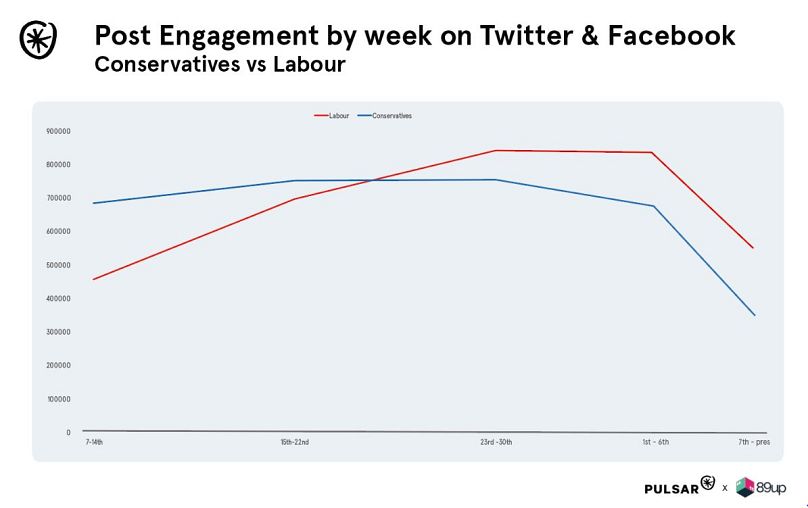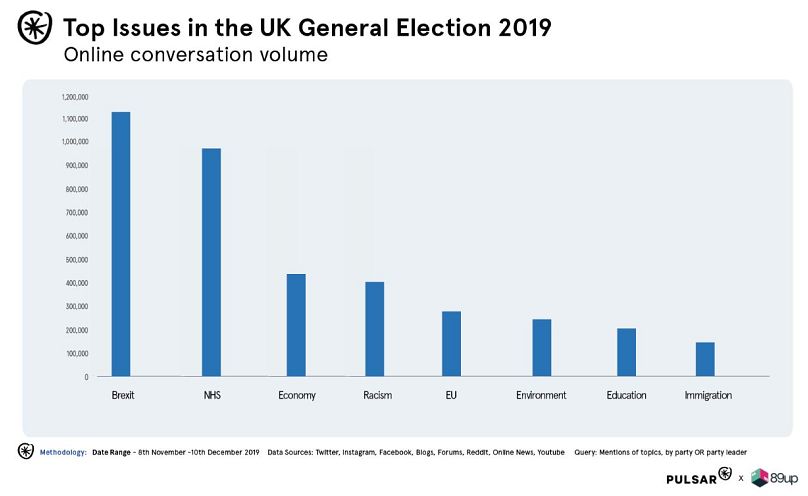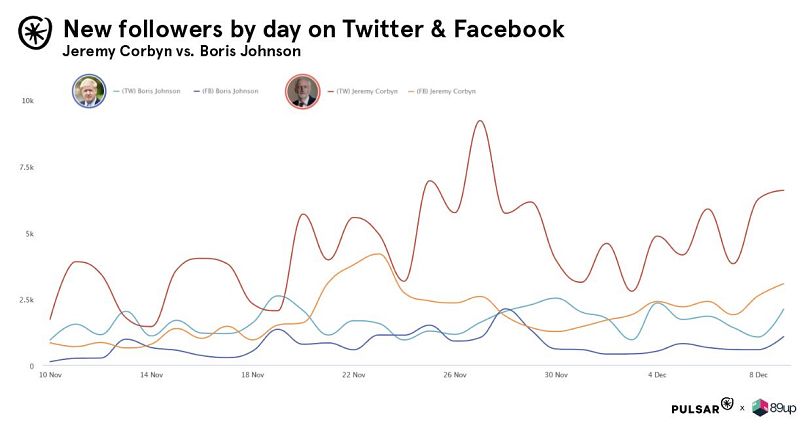Which party leader had the largest social media engagement? Which issues have become central to the election campaign?
With just hours until the polls open ahead of the UK's snap general election, the political parties, leaders and candidates are adding the final touches to their online campaign.
 ADVERTISEMENT
ADVERTISEMENT
 ADVERTISEMENT
ADVERTISEMENT
The latest poll data from YouGov shows the Conservatives are set to take a slim majority of 339 seats and approximately 43% of the vote.
And new analysis done by the social media monitoring companies Pulsar and 89up shows that social issues including racism and healthcare are resonating strongest with social media audience.
Data from the Pulsar 89up Social Media Election Index also shows that Jeremy Corbyn and the Labour Party are outperforming Boris Johnson and the Conservative Party in online engagement.
How are all the UK parties faring on social media engagement?
Despite all political parties placing emphasis on reaching potential voters through a wide variety of social media platforms, analytics show the social media conversation has become a “total two-horse race”.
“On social media, there are only really two big names in town; the Labour Party and the Conservative Party, and everyone else has been squeezed out of that conversation,” said Mike Harris, the founder and CEO of 89up
While the Brexit Party had dominated the social media conversation during the 2019 European Parliament elections, they fall well-behind the two major UK parties when it comes to social media engagement, seemingly because their unique space in the electoral spectrum has been erased.
“Nigel Farage and the Brexit Party have struggled for airtime and space, and they do not have a clear message on Brexit or at least one which is resonating on social media the same way as the Conservatives,” said Mike Harris.
“There seems to be less emotive content and less passion behind the subject of Brexit this time around … the enthusiasm for that subject has just dissipated”.
Meanwhile, the Liberal Democrats, Scottish National Party and the Green Party have also failed to connect with a social media audience on the same level as the two key parties.
Has the NHS become a bigger issue than Brexit?
The Conservatives and Labour have dominated the online voice during campaigning, according to data from the Pulsar 89up Social Media Election Index.
In terms of how much engagement their posts have received — which includes the number of shares, likes and comments — the Conservatives, as the graph below illustrates, were on top at the start of the campaign, but Labour have led since mid-November.
This is supported by data from CrowdTangle, a tool owned by Facebook which monitors social media reach and engagement.
Although Brexit remains a key issue, as predicted in the debate, the UK’s National Health Service (NHS) has received almost as many mentions by the parties and their leaders in blogs, social posts and online articles.
“I think voters are talking about Brexit in a low-key way, where people are sharing opinions online on things like tactical voting, but the stuff that's getting the most traction is about wealth inequality and the NHS,” said Mike Harris.
In particular, the Labour Party have received strong engagement from a number of social media posts relating to the state of the National Health Service, which has contributed to their narrow lead over the Conservatives online.
One of the most viral topics ahead of the election was an image of a four-year-old boy with suspected pneumonia, sleeping on a hospital treatment room floor due to a lack of beds. Social media analytics by Pulsar and 89up, show that it is live issues like health that are becoming central to voters’ conversations.
Racism makes an unwelcome entry into the election conversation
More interestingly, the subject of racism is also featuring heavily in the general election online discussion, with roughly 400,000 mentions in posts, blogs and tweets in the last month - roughly the same as the economy, a subject that has heavily influenced previous elections in the UK.
The prominence of racism in the election conversation is something that data analysts say “has never happened before”.
Last month, both the Conservatives and Labour Party faced serious accusations from religious interventions that they had failed to stamp out intolerance within their parties. While the Chief Rabbi of England had said the Labour Party’s leadership had failed to deal with antisemitism, the Conservatives were accused of dodging the issue of islamophobia by the Muslim Council of Britain. Both parties rejected these accusations.
'There’s a real sense that this election feels dirtier than previous elections'
The reason why such emotive subjects are resonating with online audiences may be linked to the algorithms on social media platforms, which give emphasis to content which receives a high level of engagement.
As opposed to heavy investment in online advertising, “the content that has done the best on social media has all been driven by genuine public engagement,” said Harris.
But this content has included a number of examples of disinformation, whether spread by parties, shared by misinformed journalists or amplified by bot social media accounts.
In November, the Conservative Party were criticised for changing their press office's Twitter profile to make it appear as a fact-checking account. Meanwhile, the Labour Party revealed previously-redacted documents which supposedly proved that the UK’s National Health Service was up for sale in a potential post-Brexit deal with the United States.
“There’s a real sense that this election feels dirtier than previous elections,” said Harris.
“Messages that are more fact-based, or messages that are more moderate, are not cutting through… [whereas] content that has an instant visceral emotive reaction is doing really well”.
The data from the Pulsar 89up Social Media Election Index raises further concerns over the spread of false information during an election on social media, something on which the platforms have faced intense scrutiny.
“I think conversations need to happen about whether platforms are doing enough to balance emotive content and factual content,” said Harris.
One thing that cannot be doubted is the immense role that social media has played in election campaigning in the UK, on occasion setting the political agenda itself. Politicians and parties across Europe may now be looking into which future issues, on a domestic or European level, will particularly resonate online with potential voters.
The research uses the sophisticated monitoring platform, Pulsar, to analyse the true social media conversation during the UK election campaign across a range of social media platforms. The data also assesses which political party and leaders are being mentioned in different social conversations and topics.
Click on the video player above to watch the full report from The Cube, Euronews' social media newsdesk.













